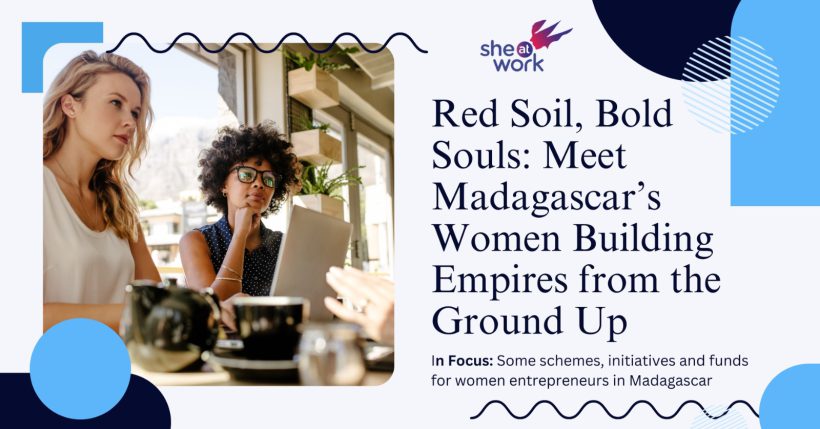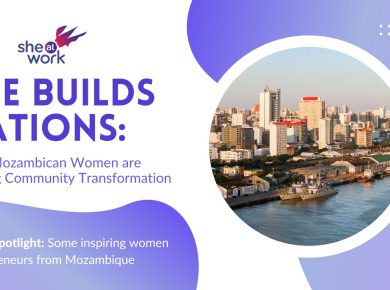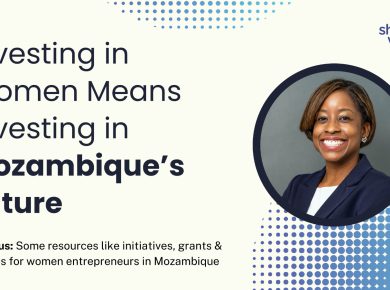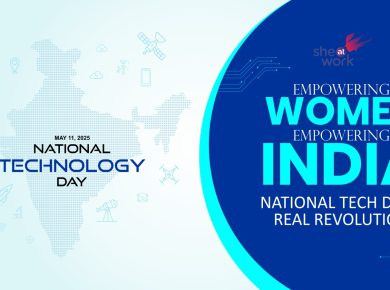In Focus: Some schemes, initiatives and funds for women entrepreneurs in Madagascar
#MadagascarWomenLead #EmpowerMalagasyWomen #IslandInnovators #SheBuildsAfrica
Enterprising Women Entrepreneurs of Madagascar: Empowering Change on the Great Red Island
Painted as “The Great Red Island” for its striking crimson soil, Madagascar is not only rich in biodiversity, but also in the spirit of resilience and innovation – especially among its women. Despite facing persistent social and economic challenges, women in Madagascar are stepping confidently into the world of entrepreneurship, transforming their communities through creativity, determination & enterprise.
Owning Land, Leading Change, Breaking Barriers: The New Era of Malagasy Women Entrepreneurs
Legally, women in Madagascar have equal rights to own property and start businesses. However, in some regions (particularly along the east coast) – customary laws still restrict land ownership for women. Yet, this has not deterred a growing wave of enterprising women who are launching businesses – in sectors like agriculture, textiles, tourism & crafts.
Governmental and non-governmental programs across the country are working to support these women by providing access to financial services, business development training & platforms for networking. These efforts, coupled with legal reforms, are enabling more women to break economic barriers and assert their independence.
Empowered, Enterprising, Unstoppable: How Women in Madagascar Are Transforming the Economy
So, women entrepreneurs in Madagascar are not just trying to build businesses, but they are indeed, re-building societal norms and empowering future generations. Their stories reflect the strength of Madagascar’s evolving entrepreneurial landscape and the vital role women play in driving inclusive, sustainable development.
Let us now look at some schemes, initiatives and funds that are available for women entrepreneurs in Madagascar.
- African Women in Business Initiative (AWIB)
The African Development Bank Group’s AWIB focuses on empowering women entrepreneurs, particularly SMEs, by giving them better access to finance.
African Women In Business (African-WIB) propels women entrepreneurs into economic, social and political spheres of power worldwide by:
– Strengthening the wealth creating capacity of their members and promoting economic development within the entrepreneurial community
– Creating innovative, effective change in the business culture
– Building strategic alliances, coalitions and affiliations
– Transforming public policy and influencing opinion makers
The African Women In Business Initiative (AWIB) responds to the Bank’s Private Sector Development Strategy emphasis on the role of women in business as well as to empower women entrepreneurs, in particular SMEs, through better access to finance.
In this respect, the Private Sector and Microfinance Department (OPSM) has developed under the Initiative, integrated financing programs for women’s entrepreneurship development in order to:
- contribute to a more equitable business environment for women entrepreneurs and enhance their contribution to economic development;
- develop SME financing instruments and mechanisms to enhance the financial market and assist successful SMEs to grow their enterprises.
- African Women’s Entrepreneurship Program (AWEP)
A program from the US Department of State that provides funding and capacity-building resources to African businesswomen to promote their participation in international trade.
AWEP is an outreach, education, and engagement initiative that targets African women entrepreneurs – to promote business growth, increase trade both regionally and to U.S. markets through the African Growth and Opportunity Act (AGOA), create better business environments, and empower African women entrepreneurs to become voices of change in their communities.
Through the African Women’s Entrepreneurship Program (AWEP), the U.S. Department of State seeks to dismantle the obstacles to business opportunities and economic participation that African women face. Launched in July 2010, the initiative identifies and builds networks of women entrepreneurs across sub-Saharan Africa poised to transform their societies by owning, running, and operating small and medium businesses, and by becoming voices for social advocacy in their communities.
- Women Entrepreneurs Finance Initiative (We-Fi)
This initiative, hosted by the World Bank, aims to open doors for women entrepreneurs in the developing world by harnessing public & private sector resources.
The Women Entrepreneurs Finance Initiative (We-Fi) supports women entrepreneurs – by scaling up access to financial products and services, building capacity, expanding networks, offering mentors, and providing opportunities to link with domestic and global markets.
They believe in women as change agents and drivers of economic growth.
Founded in October 2017, We-Fi harnesses the public and private sectors – to open new doors for women entrepreneurs across the developing world. With funding of $354 million from 14 governments, this collaborative partnership among governments, multilateral development banks, and other stakeholders has been designed – to unlock financing for women-led/owned businesses in developing countries, including in the most challenging environments. We-Fi supports women entrepreneurs by scaling up access to finance, markets, networks and mentors and information. Plus, it is also assisting governments in creating enabling environments for women in business.
- RevUp Women
RevUp Women by AfriLabs empowers early-stage women-led African startups & SMEs – to overcome unique challenges that hinder their growth and success.
It is designed to accelerate female-led businesses into profitable & sustainable ventures that can stimulate the creation of jobs on the continent. At the end, 500 women business owners would have received capacity-building training and mentoring while 10 women business owners will be funded with 10,000 dollars grant by Visa Foundation to grow their businesses. The initiative is funded by The Visa Foundation and aligns with AfriLabs’ inclusion strategy.
They aim – to provide capacity-building training and mentoring to 500 women business owners in 5 African countries, fund 10 women-owned businesses with $10,000 each, and build 5 mentoring networks across the continent
- Trade Finance Facilities
The Trade and Development Bank (TDB) has provided a USD 10.6 million trade finance facility – to support Les Epices de Madagascar, a woman-owned Fair Trade vanilla exporting company. This helps improve access to finance for women-owned businesses.
Of the 1.1 million jobs supported by TDB’s active loans, 55% are held by women. In Madagascar, a USD 10.6 million trade finance facility to support Les Epices de Madagascar, a woman-owned Fair Trade vanilla exporting company employing over 1,000 workers.
TDB is contributing to bridging the gap for providing finances, and achieving SDG 5, by streamlining gender equity and equality in its own organization as well as through projects and initiatives. Of the 1.1 million jobs supported by TDB’s active loans, 55% are held by women.
The financing from TDB has had a positive impact – on agricultural productivity and incomes of small-scale food producers, in particular women, indigenous people and family farmers. The company also provides agricultural training for women farmers on harvesting quality vanilla beans, ensuring they get a premium price for their harvests, empowering and promoting the economic inclusion of women in economic activities in Madagascar.
- World Bank’s Financial Inclusion Project
The World Bank approved a $45 million International Development Association (IDA) credit – to promote financial inclusion, specifically targeting women and women-owned enterprises, to reduce disparities in access to finance.
The development objective of Financial Inclusion Project is – to promote the financial inclusion of individuals and Micro, Small and Medium-sized Enterprises (MSMEs) in Madagascar.
- RECAMP Training
The COMFWB (COMESA Federation of Women in Business) Madagascar has successfully carried out a RECAMP Training program – to enhance the competitiveness and market access of Malagasy women entrepreneurs. The training focuses on technical, entrepreneurial & managerial skills.
The Regional Enterprise Competitiveness and Access to Markets programme (RECAMP) is about boosting participation of the private sector in regional and global value chains. The programme does this through the improvement of the investment and business climate and enhanced competitiveness in the COMESA region.
- SME Business Linkage Programme
This program, launched by the African Development Bank – offers training, access to markets & finance to Malagasy SMEs, with a significant portion run by women and young people.
The African Development Bank on 14 September 2023 launched a digital platform in Madagascar – to help drive business linkages in the island country southeast of Africa.
The Mada Business Linkage is a B2B digital platform that interconnects registered businesses operating in Madagascar. Launched in the capital, Antananarivo, it targets companies looking for suppliers or subcontractors and gives visibility to firms seeking business partnerships.
- Policies
In 2015, the seventeen Sustainable Development Goals (SDGs) were adopted by the General Assembly of Member States of the United Nations. By adhering to the Global Agenda for Sustainable Development 2030 and Agenda 2063 for Africa, Madagascar has reaffirmed the essential place of gender equality in national policies.
The country has drawn up several strategic documents to achieve this objective, in particular – the “National Policy for the Advancement of Women for a balanced development between men and women”, the National Policy for Gender Equality and the five-year action plans.
However, the national report on the prioritization of the SDGs by Madagascar highlighted the need to review gender-related policies and strategies in order to effectively achieve the full participation and empowerment of women in society.
https://www.unicef.org/madagascar/media/8671/file/Gender%20inequalities%20in%20Madagascar.pdf
- Strengthening growth and promoting US market access to women-led agricultural businesses in Madagascar
Women entrepreneurs are important sources of innovation, job creation & economic growth, and critical actors in every aspect of the agriculture value chain. The US Embassy partnered with the American Chamber of Commerce in Madagascar (AmCham) – to empower Malagasy women entrepreneurs in the agriculture sector to access U.S. markets.
More than half of AmCham Madagascar’s member companies operating in the food sector are led by women, but many of these companies do not take advantage of the lucrative U.S. market due to challenges understanding and meeting the strict standards and certifications required to export products to the United States.
To address this need, AmCham will host workshops in Antananarivo, Toamasina, and Antsirabe – for women leaders of food sector businesses to promote their ability to enter the U.S. market. Women will learn the tools and networking opportunities needed to adapt their business strategies and reach American consumers. These women entrepreneurs will learn about microfinance institutions and preferential trade opportunities such as the African Growth and Opportunity Act (AGOA).
The project is funded by the POWER – Providing Opportunities for Women’s Economic Rise initiative – a program supported by the U.S. Bureau of Economic and Business Affairs. This initiative supports projects that connect the U.S private sector with women entrepreneurs & business leaders – to support women’s economic participation, improve the financial position of women worldwide, and promote trade and economic relations between the United States and partner nations.
- Affirmative Finance Action for Women in Africa initiative (AFAWA)
Interestingly, Africa has the highest proportion of women entrepreneurs globally, but they face significant challenges securing funding for their ventures.
The Global Entrepreneurship Monitor’s (GEM) 2016/17 Women’s Report showed that more than a quarter of all businesses on the continent are either started or run by women. However, their access to finance has been disproportionately low, with the Africa Development Bank (AfDB) estimating a financing gap of US$42 billion for African women across various business value chains, including US$15.6 billion in agriculture alone.
However, that seems to be changing.
Commercial lenders and development financiers in Africa are widening their gender lens and warming to female-led startups.
A Banking in Africa Survey 2024 by the European Investment Bank reveals that 72% of commercial lenders on the continent have implemented a gender strategy, with an additional 17% planning to introduce one. Meaning that nearly nine out of ten banks on the continent could soon have a gender strategy in place.
During the World Bank Group’s Annual Meetings in October 2024, the institution launched its Gender Strategy 2030 – targeting to provide capital to an additional 80 million women and women-led businesses, addressing a crucial constraint to entrepreneurial growth.
To enhance access to capital for women and women-led businesses – the Bank plans to collaborate with regulators, financial institutions, fintech companies, incubators, accelerators, and private equity funds to address gender biases in lending practices.
The African Development Bank (AfDB) has its own Gender Strategy for 2021-2025, which is based on three pillars: empowering women through access to finance and markets; accelerating professional integration and job creation for women through skills enhancement; and improving women’s access to social services through infrastructure.
In March, the AfDB reported that it had secured more than US $1.5 billion in investment for Africa’s women-led small and medium-sized enterprises through its Affirmative Finance Action for Women in Africa initiative (AFAWA) in less than two years. AFAWA invites financial institutions to invest in women by unlocking financing for women-led small and medium enterprises.
Through these initiatives – more women are getting access to loans, helping to demistify their perceived ‘poor credit ratings’, as banks report better loan performance among female-led firms.
- Access to capital for women entrepreneurs in Madagascar
Women entrepreneurship can be a lever for the development of Madagascar within the framework of the New Millennium Development Goals (MDGs). However, financing remains a major problem – especially for women entrepreneurs with a low level of education, especially in rural areas.
Equity and informal borrowings remain the main source of financing today. Several cultural and socio-economic barriers limit access to alternative sources of financing. For example, much remains to be done for the popularization of microfinance. It is therefore a question of giving them the support necessary for their professional development.
- BFV – Societe Generale
A subsidiary of the French group Société Générale, the BFV is the second network of banks in Madagascar with 45 branches located in 22 regions.
BFV – Société Générale offers companies a range of choices ranging from medium-term loans to investment financing:
- Covering cash mismatches and/or ensuring part of current operating needs
- Possibility of temporarily exceeding the authorization limit with the written agreement of Societe Generale Madagasikara
- All kinds of credit designed for companies of all sizes ranging from SMEs to large national and multinational groups.
- BMOI, BPCE group
BMOI is a subsidiary of the BPCE group, which ranks first in the banking sector in France. The bank is present in the 6 former provincial capitals as well as in 4 major cities of Madagascar.
Opening a current account with BMOI allows:
- Securing money and financial transactions
- Simplified account monitoring and management
- Subscription to various insurance products
- Investments at advantageous rates
- Obtaining various credits
For professionals, operating loans and the financing of international transactions are part of the services offered.
- BNI Madagascar
The BNI is a banking institution in Madagascar, which has 43 branches and 68 ATMs in the 22 regions of Madagascar.
The services offered by the BNI are aimed at individuals, professionals, SMEs and institutions. Personal, or short, medium and long-term credits are possible for the financing of projects, in particular investment credits and cash credits (overdraft facility, authorized overdraft, commercial discount, advance on pledged stocks, campaign credit, advance on invoice, etc.).
The BNI has an SME Window available – for assistance with business creation, financial management advice and financing solutions.
- BOA Madagascar
BOA is the leading bank in Madagascar in terms of coverage. Their range of services include – current accounts, savings accounts and different types of loans.
BOA Madagascar becomes the exclusive bank of the Group of Women Entrepreneurs in Madagascar (GFEM) for its activities during this year. The bank supports the Groupement in all the sectors of economic activity where its members are developing, from agribusiness to crafts, including textiles. The BOA thus supports women entrepreneurs and simplifies their access to financial services and financing.
The BOA also offers its services to professionals and carries out:
- Support for SMEs
- Market financing for operators
- Support for large companies
- Refinancing to microfinance institutions
- MICROCRED Madagascar
Microcred Banque Madagascar is a banking institution that provides financial products & services to people, who do not have access to them through the traditional banking sector. Microcred’s main objective is – to accelerate the financial inclusion of local populations. The majority of its clientele is made up of micro and small entrepreneurs, who cannot access traditional banking services and products.
During the World Bank Group’s Annual Meetings in October 2024 – the institution launched its Gender Strategy 2030, targeting to provide capital to an additional 80 million women and women-led businesses, addressing a crucial constraint to entrepreneurial growth.










